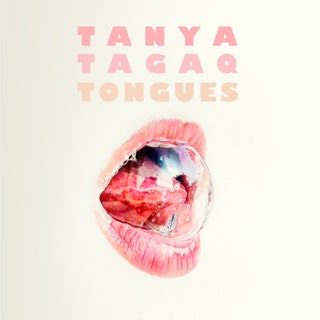Vivifying scenes from her debut novel, the Inuk experimentalist and throat-singer marries fiery condemnations of oppression with tender words of protection for future generations.
In Tanya Tagaq’s 2018 book Split Tooth, she describes a girl, perhaps herself, who leaves her body. From the remove of a dark, blank space, this girl watches a house party unfurl—and senses the presence of another being there, with her, watching. “It was a human once,” she writes. “It is huge and sinuous, a jumble of muscle and gristle.” It is ravenous; it wants to kill. And if the girl doesn’t make it back to her own body in time, this thing will take it from her by force.
On Tongues, Tagaq’s fifth studio album, which borrows many of its lyrics from Split Tooth, the line between woman and monster is gossamer-thin. Tagaq is a maestro of Inuit throat-singing. To outside listeners, the guttural tone of throat-singing can sound otherworldly. In Denis Villeneuve’s 2021 film Dune, the director cast a throat singer to preside over a grisly bloodletting and prepare an army for extraterrestrial slaughter. This is a far cry from traditional Inuit throat-singing, which is usually performed in friendly competition by two women, each trying to outlast the other. On Tongues, Tagaq is her own duet partner, by turns warm and wrathful. Her low growl holds the power to terrify, but often, it is her pronouncements in plain, spoken English that most chill the blood.
Last year, Canadian authorities discovered the unmarked mass graves of nearly 1,400 Indigenous children on the grounds of five former residential schools. Tagaq, now 46, recalls leaving home at 15 to attend one such school. Throughout her career, and long before last year’s reckoning, she has advocated for herself and other victims of the system. “You can’t take our tongues,” she says, on the album’s title track. “You can’t take our blood.” And then, dipping into her guttural register, she sings, “Inuuvunga/Tukisivunga”—I am an Inuk; I understand. She soothes her sisters, then turns, once more, to condemn the complicit.
The latter category includes this critic, along with many of the parties who have acclaimed Tagaq and awarded her some of Canada’s highest honors. A recipient of the Polaris Prize, multiple Juno Awards, and the Order of Canada, Tagaq boldly uses her place in the country’s cultural firmament to challenge its very foundation. When she vocalizes in English, she speaks and sings with open hostility to her audience. “Colonizer” emerges from her throat as an epithet, in a rasp, deep and low and sibilant. She cries, “You’re guilty,” and repeats the line, again and again, a broad indictment, a blunt instrument.
Yet her songs also point at very specific targets. Opening track “In Me” is a celebration of Indigenous hunting practices, and a middle finger to “moralizing” white vegans. “I Forgive Me” takes aim at rapists, promising swift justice: “I do not forgive and forget/I protect and prevent/Make them eat shame and repent.” The album’s best track, “Teeth Agape,” is also its vividly bloodiest, a dual condemnation of residential schools and modern foster care. Over a menacing industrial swirl, Tagaq speaks of sharpening her claws and baring her fangs. “Touch my children,” she says, “and my teeth welcome your windpipe.”
In these songs, that ravenous, sinuous jumble of muscle and gristle swells within Tagaq’s body. It is a fearful presence, but a righteous one. It speaks with a strength that the young girl at that long-ago house party did not yet know how to wield. The violence this being threatens is the protective kind.
But there is room, too, for tenderness. In the latter half of Tongues, Tagaq turns to her Indigenous listeners, especially women and girls, and faces them the way an Inuk throat-singer faces her partner. “Do Not Fear Love” originated as free verse in the pages of Split Tooth. It is reformed on Tongues as a meditation, replete with instructions to inhale, exhale, and observe one’s anxious thoughts. “Thank them for trying to protect you,” Tagaq says, of such “small fears,” reciting the words above low synths, steady drums, and the hollow swell of an organ. She wrote the album’s closing track, “Earth Monster,” for her daughter, Naia, on the child’s sixth birthday. Reveling in Naia’s breath, her smile, “her voice, her earnest voice,” she rotates between pet names: “my small one,” “my truly mine,” “my earth monster.” Here, “monster” is as delivered as sweetly as any other nothing a mother might murmur to a beloved daughter. It is an encouragement of anger, of tears, of sharp teeth and glittering claws.
Both girl and monster, Tagaq seems to say, can share the same body. They can nurture one another. They can make the world safer for the next girl born into it.



0 comments:
Post a Comment